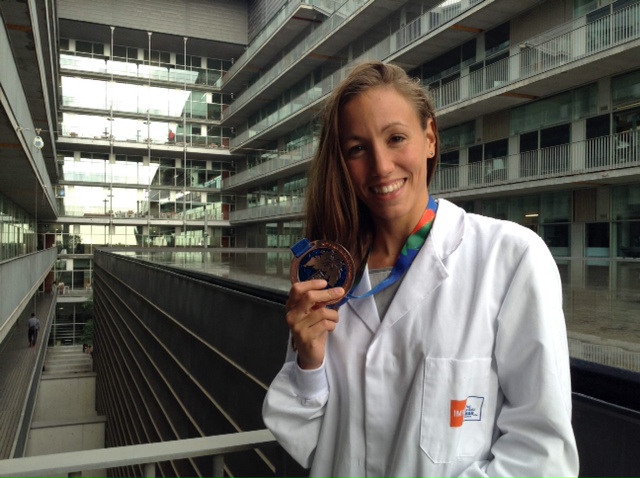‘I feel very lucky to be able to live my dream as an athlete, but eventually you get too old for sports, and you have to think about the future’
‘I feel very lucky to be able to live my dream as an athlete, but eventually you get too old for sports, and you have to think about the future’
‘I feel very lucky to be able to live my dream as an athlete, but eventually you get too old for sports, and you have to think about the future’
 Jessica Vall won the bronze medal in the 200m breaststroke at last summer’s World Swimming Championships in Kazan (Russia). She holds an undergraduate degree in Human Biology from UPF and currently works at the Hospital del Mar Medical Research Institute (IMIM), in the Bioanalysis and Analytical Services research group, as a researcher in training.
Jessica Vall won the bronze medal in the 200m breaststroke at last summer’s World Swimming Championships in Kazan (Russia). She holds an undergraduate degree in Human Biology from UPF and currently works at the Hospital del Mar Medical Research Institute (IMIM), in the Bioanalysis and Analytical Services research group, as a researcher in training.
- How did you feel when you saw that you had won the bronze medal at the World Championship in Kazan?
It’s hard to put into words, but a bunch of feelings and thoughts go through your head at once, making you feel absolutely elated. You know how much effort you put in to get there, but you aren’t really aware of everything you are experiencing. It’s taken me a couple of months to begin to assimilate it all.
- What is the next athletic challenge you have set for yourself? An Olympic medal, perhaps?
My next challenge is to be able to compete at the Olympics. I have never participated in any edition. A medal? That’s light years away.
- How do you prepare for the competitions? What is your daily training routine like?
This year, we’ll start with an initial cycle in which I won’t compete a lot. We’ll try to establish a good aerobic base, training at altitudes, before moving on to the next cycles, which will focus on strength and intensity. My daily routine actually follows a very strict schedule, and it’s important never to be late, because that can push everything back. I get up at five in the morning in order to be in the water at six and lift some weights or go running. At about 9:30, I have breakfast and go to the IMIM, where I work until about 1:30. At 2:45 in the afternoon, I’m back in the water. After that, I never know what time I’ll be done.
- How do you balance that pace with your work at the IMIM?
Thanks to the invaluable support of Jordi Segura, the head of the research group I belong to, the flexible hours, and my colleagues.
- What do you do for a living? What projects are you working on?
I work as a researcher in training on a project funded under the Spanish National R&D and Innovation Plan related to chemical and biological analyses based on a single drop of blood. Analytical micro- and nanotechnology are developments with a lot of potential for the future of clinical and biomedical practice.
- You studied human biology. What made you choose that degree programme?
In secondary school, I knew that medicine was one of the degree courses I was most interested in, but I wasn’t sure I wanted to be dealing with patients. My secondary school supervisor, Joaquim Molina – from the SEK school – talked to me about the possibility of pursuing a degree in biology offered by UPF that was much more specialized in humans. I was very confident about listing it as my first choice. If I had to go back and do it all again, I would choose the same programme. I am very happy with my years at the University.
- At the time, you prioritized academics over competing. Why did you make that choice?
To some extent, it’s what my parents always taught me. I feel very lucky to be able to live my dream as an athlete, but eventually you get too old for sports, and you have to think about the future. Also, when I was studying for my degree, I had a supervisor, Meritxell Girvent, who gave me great advice and who would move heaven and earth whenever I needed it to smooth my passage through university. I will always be grateful to her.
- The academic year has just started. What would you tell new students who have just enrolled at the University?
That university is not secondary school. That no one is going to follow you around here, insisting that you study or do your homework. And, even though it’s a cliché, that you should try to study every day.
- And to those students who, like you, are also elite athletes?
That even though it may seem impossible, you need to be organized and never give up. Ask for help whenever you need it, but never rest on your laurels or you’ll regret it.
